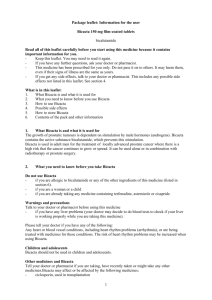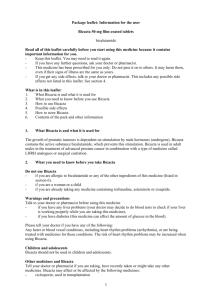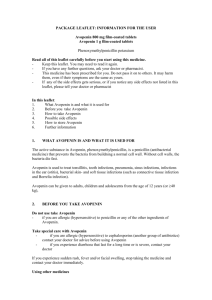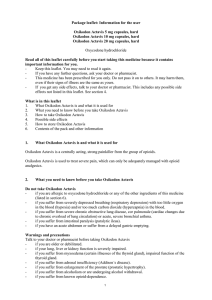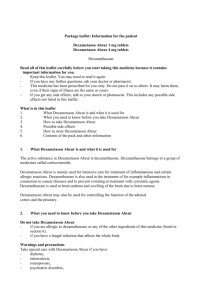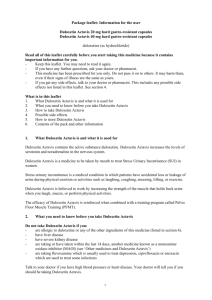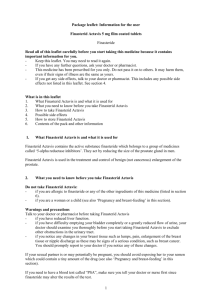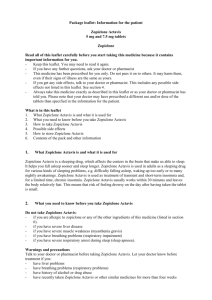Itrakonazol Actavis capsule, hard ENG
advertisement
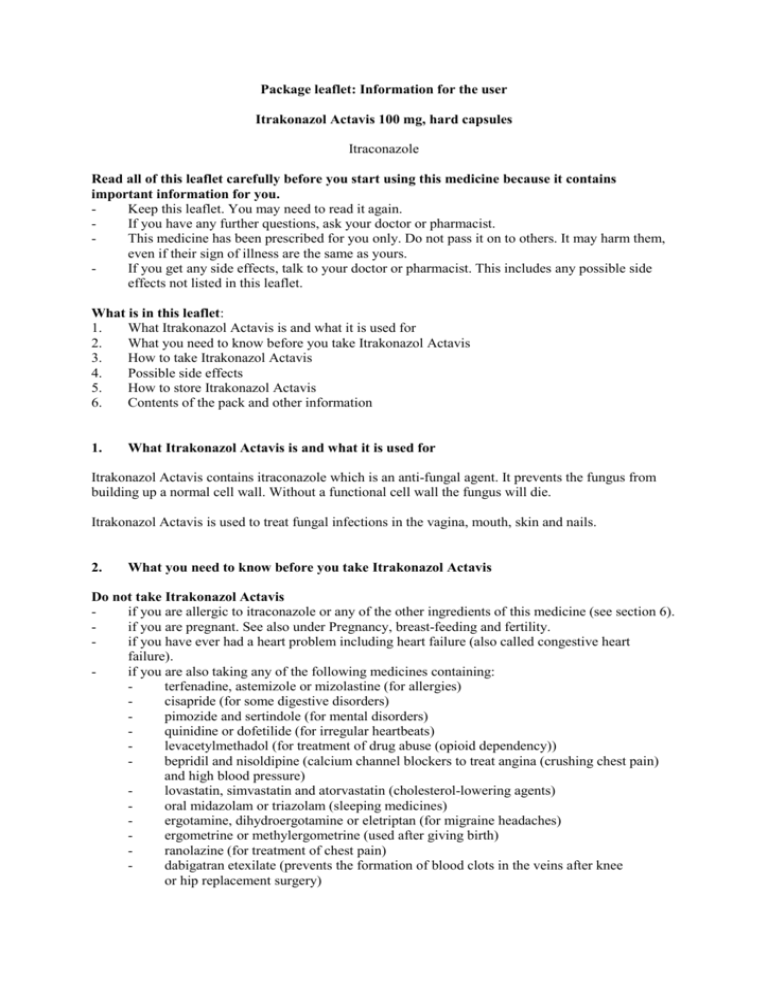
Package leaflet: Information for the user Itrakonazol Actavis 100 mg, hard capsules Itraconazole Read all of this leaflet carefully before you start using this medicine because it contains important information for you. Keep this leaflet. You may need to read it again. If you have any further questions, ask your doctor or pharmacist. This medicine has been prescribed for you only. Do not pass it on to others. It may harm them, even if their sign of illness are the same as yours. If you get any side effects, talk to your doctor or pharmacist. This includes any possible side effects not listed in this leaflet. What is in this leaflet: 1. What Itrakonazol Actavis is and what it is used for 2. What you need to know before you take Itrakonazol Actavis 3. How to take Itrakonazol Actavis 4. Possible side effects 5. How to store Itrakonazol Actavis 6. Contents of the pack and other information 1. What Itrakonazol Actavis is and what it is used for Itrakonazol Actavis contains itraconazole which is an anti-fungal agent. It prevents the fungus from building up a normal cell wall. Without a functional cell wall the fungus will die. Itrakonazol Actavis is used to treat fungal infections in the vagina, mouth, skin and nails. 2. What you need to know before you take Itrakonazol Actavis Do not take Itrakonazol Actavis if you are allergic to itraconazole or any of the other ingredients of this medicine (see section 6). if you are pregnant. See also under Pregnancy, breast-feeding and fertility. if you have ever had a heart problem including heart failure (also called congestive heart failure). if you are also taking any of the following medicines containing: terfenadine, astemizole or mizolastine (for allergies) cisapride (for some digestive disorders) pimozide and sertindole (for mental disorders) quinidine or dofetilide (for irregular heartbeats) levacetylmethadol (for treatment of drug abuse (opioid dependency)) bepridil and nisoldipine (calcium channel blockers to treat angina (crushing chest pain) and high blood pressure) lovastatin, simvastatin and atorvastatin (cholesterol-lowering agents) oral midazolam or triazolam (sleeping medicines) ergotamine, dihydroergotamine or eletriptan (for migraine headaches) ergometrine or methylergometrine (used after giving birth) ranolazine (for treatment of chest pain) dabigatran etexilate (prevents the formation of blood clots in the veins after knee or hip replacement surgery) Warnings and precautions Talk to your doctor before taking Itrakonazol Actavis: if you have previously been allergic to any other anti-fungal medicine if you have any heart trouble as you may be more likely to get certain side effects. Contact your doctor immediately if you have difficulty breathing, unexpected weight gain, swollen legs or stomach, feel unusually tired or if you start to wake up at night if you have reduced liver or kidney function as you may need to take a different dose if you have Acquired Immunodeficiency Syndrome (AIDS) or if your immune system is not working as well as it should Children Itraconazole capsules are not normally given to children. However, your doctor may prescribe them in special cases. Elderly Itraconazole capsules are not normally given to elderly. However, your doctor may prescribe them in special cases. Stop taking the medicine and contact your doctor immediately if you have any signs of liver problems, such as loss of appetite, nausea, vomiting, fatigue, stomach pain or markedly darker urine. Your doctor may want you to have regular blood tests to check your liver function. It is important that you come for these blood test check-ups (see section 4). If you feel pins and needles, numbness or weakness in your hands or feet, talk to your doctor as soon as possible (see section 4). Other medicines and Itrakonazol Actavis Tell your doctor or pharmacist if you are taking, have recently taken or might take any other medicines.This is very important as Itrakonazol Actavis can interact with other medicines. This may increase or decrease the effects of either medicine. Some medicines must not be taken together with Itrakonazol Actavis. These medicines are listed in section “Do not take Itrakonazol Actavis”. If you are taking any of the following medicines, your doctor may change the dose of Itrakonazol Actavis or of the other medicine: certain antibiotics such as clarithromycin and erythromycin certain medicines affecting heart and blood vessels (e.g. digoxin, disopyramide and calcium channel blockers such as verapamil and cilostazol) anticoagulants (blood thinning agents) (e.g. warfarin) certain anti-HIV medicines (protease inhibitors such as ritonavir, indinavir, saquinavir) certain anti-cancer medicines (e.g. vinca alkaloids, busulphan, docetaxel and trimetrexate) cyclosporin, tacrolimus and sirolimus usually given after organ transplantation (immunosuppressive agents) dexamethasone, budesonide, fluticasone and methylprednisolone (for inflammations) certain anti-anxiety medicines such as buspirone, alprazolam, brotizolam and intravenous midazolam phenytoin, phenobarbital and carbamazepine (for epilepsy) rifabutin, rifampicin and isoniazid (for tuberculosis) ebastine (for allergy) reboxetine (for depression) alfentanil and fentanyl (for pain in connection with surgery) herbal medicine containing St. John’s Wort (Hypericum Perforatum) omeprazole and esomeprazole (for stomach ulcer and acid eructation) halofantrine (for malaria) repaglinide (for diabetes) 2 Itraconazole is only absorbed into your body if your stomach has the right amount of acid in it. If you are taking medicines to reduce stomach acid, (for example indigestion medicines), do not take them until at least 2 hours after you have taken Itrakonazol Actavis and always take your Itrakonazol Actavis capsules with an acid drink such as orange juice or a cola drink. Itrakonazol Actavis with food and drink Take Itrakonazol Actavis capsules immediately after a meal as this improves absorption. Pregnancy, breast-feeding and fertility If you are pregnant or breast-feeding, think you may be pregnant or are planning to have a baby, ask your doctor or pharmacist for advice before taking this medicine. Do not take Itrakonazol Actavis if you are pregnant unless specifically advised by your doctor. If you are of childbearing potential you should use contraceptives while using itraconazole.As itraconazole remains in the body for some time after you have taken it, continue to use contraceptives until you have had your first period after you have stopped taking the medicine. Itraconazole passes into breast milk, but will probably not affect a nursing child. If you are breastfeeding, talk to your doctor or pharmacist before you start to take Itrakonazol Actavis. Driving and using machines You alone are responsible to decide if you are in a fit condition to drive a motor vehicle or perform other tasks that demand increased concentration. Side effects such as dizziness, visual disturbances and hearing loss can occur (see section 4). Do not drive or use machines if you experience any of these side effects. Read all the information in this leaflet for guidance. Discuss with your doctor or pharmacist if you are unsure about anything. Itrakonazol Actavis contains sucrose If you have been told by your doctor that you have an intolerance to some sugars, contact your doctor before taking this medicinal product. 3. How to take Itrakonazol Actavis Always take this medicine exactly as your doctor has told you. Check with your doctor or pharmacist if you are not sure. Take Itrakonazol Actavis capsules immediately after a meal. This will make it easier for the medicine to be absorbed into the body. Swallow the capsules whole. Your doctor will decide which dose you will take, based on your individual needs. The usual dose for adults varies from 1 to 4 capsules per day. The duration of therapy depends on type of infection and varies from 1 day to 3 months. For fungal nail infections, you may take the medicines continuously or in pulses. Continuous treatment usually last for 3 months. For pulse therapy, you may take 2 or 3 pulses. Each pulse consists of treatment for one week followed by a 3-week medicine-free period. If you take more Itrakonazol Actavis than you should If you have taken more Itrakonazol Actavis than you should, contact your doctor, hospital or pharmacist to get an opinion of the risk and advice on action to be taken. Symptoms of an overdose include nausea, abdominal pain, dizziness, headache and other of the described adverse reactions listed in section 4. If you forget to take Itrakonazol Actavis 3 If you miss a dose, take it as soon as you remember. If it is near the time of your next dose, skip the missed dose and take your next dose as usual. Do not take a double dose to make up for a forgotten capsule. If you stop taking Itrakonazol Actavis Your doctor will tell you how long your treatment will last. Do not stop taking the capsules before the prescribed course is finished because the infection may not be completely cured. It may take several weeks after you have finished your treatment before all symptoms disappear. If you have any further questions on the use of this medicine, ask your doctor or pharmacist. 4. Possible side effects Like all medicines, this medicine can cause side effects, although not everybody gets them. If you experience any of the following serious side effects, stop taking your capsules and tell your doctor immediately or go to the nearest hospital accident and emergency department. Not known: frequency cannot be estimated from the available data: Symptoms of angioedema, such as swelling of the face, tongue and throat, hives and difficulty swallowing and breathing. Severe allergic reactions with fever, rash, swelling and sometimes a fall in blood pressure Serum sickness (rash, fever, joint pain, enlarged lymph nodes). A tingling and/or burning sensation, numbness and/or weakness in your limbs (peripheral neuropathy). Heart failure with symptoms like difficulty breathing, unexpected weight gain, swollen legs or stomach, feeling unusually tired or waking up at night. Shortness of breath due to abnormal build up of fluids in the lungs (pulmonary oedema) Liver disease with symptoms such as: loss of appetite, feeling sick, vomiting, fatigue, stomach pain, jaundice (yellowy tinge to the skin and to the whites of the eyes), markedly darker urine or pale stools. Severe skin disorders with rashes, pustules or blistering and peeling of the skin, mouth, eyes and genitals together with fever. Hearing loss. There is a small risk that it may become permanent. Other possible side effects with Itrakonazol Actavis: Common side effects (may affect up to 1 in 10 people ): Feeling sick. Stomach pain. Rash. Unkommon side effects (may affect up to 1 in 100 people): Hypersensitivity. Headache or dizziness. Numbness or tingling (paraesthesia). Vomiting, constipation, diarrhoea. If the diarrhoea lasts for several days, you should contact your doctor as you may need to change your medicine. Indigestion. Change in taste (dysgeusia). Wind. Increase in liver enzymes (shown by blood test). Hives (urticaria). Itchy skin (pruritus). Unusual hair loss or thinning (alopecia). 4 Problems with periods. Swelling due to fluid under the skin (oedema). Rare side effects (may affect up to 1 in 1,000 people): Low white blood cell count (leukopenia). Loss of sensitivity to pain or touch (hypoaesthesia). Visual disturbance. Ringing or buzzing in the ears (tinnitus). Severe upper stomach pain, often with nausea and vomiting due to inflammation of the pancreas. Need to urinate more often (pollakiuria). Fever. Not known (frequency cannot be estimated from the available data): Decrease in the main part of the white blood cells (neutropenia). Reduction in the platelets in the blood (thrombocytopenia). Reduced blood content of potassium. Increased blood content of triglycerides. Blurred or double vision (diplopia). Sensitivity of the skin to light. Inflammation of blood vessels. Muscle pain (myalgia). Joint pain (arthralgia). Unexpected passing of urine. Erection difficulties. If you get any side effects, talk to your doctor or pharmacist. This includes any possible side effects not listed in this leaflet. 5. How to store Itrakonazol Actavis Keep this medicine out of the sight and reach of children. Do not use this medicine after the expiry date which is stated on the carton after EXP. The expiry date refers to the last day of that month. Do not store above 25C. Do not throw away any medicines via wastewater or household waste. Ask your pharmacist how to throw away medicines you no longer use. These measures will help protect the environment. 5 6. Contents of the pack and other information What Itrakonazol Actavis contains - The active substance is itraconazole. 1 hard capsule contains 100 mg itraconazole. The other ingredients are sugar spheres (sucrose and maize starch), poloxamer and hypromellose. Capsule shell: Gelatine and colouring agents (indigo carmine (E 132), quinoline yellow (E 104) and titanium dioxide (E 171)). What Itrakonazol Actavis looks like and contents of the pack Opaque green gelatine capsules with yellowish-beige spherical micro-granules. Itrakonazol Actvis is available in the following pack sizes: 4, 6, 15, 18, 28, 30 and 100 capsules. Not all pack sizes may be marketed. Marketing Authorisation Holder: Actavis Nordic A/S, Ørnegårdsvej 16, DK-2820 Gentofte, Denmark. Manufacturer: LABORATORIOS LICONSA S.A. Avda. Miralcampo, No 7, Polígono Industrial Miralcampo 19200 Azuqueca de Henares (Guadalajara) Spain This leaflet was last revised in 2013-01-09 6


